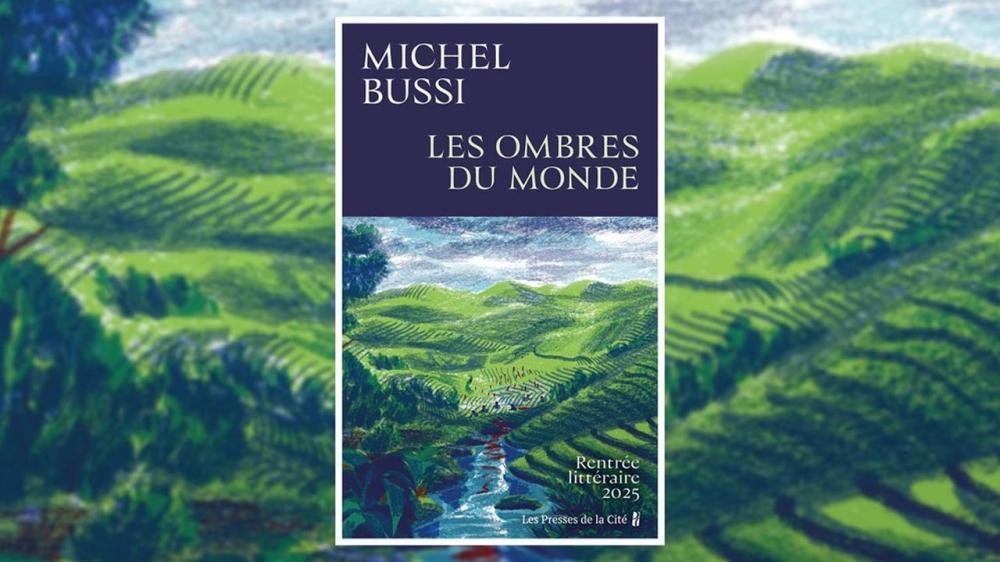Africa-Press – Rwanda. Michel Bussi’s Les Ombres du monde – The Shadows of the World, in English – published in France last month, is an unexpected novel. Bussi tackles the 1994 Genocide against the Tutsi in Rwanda by using the tropes of crime fiction to reach readers who might otherwise never have engaged with this history.
The story follows Jorik Arteta, a former French soldier, who returns to Rwanda 30 years later with his daughter Aline and granddaughter Maé, whose dream is to see the mountain gorillas. The 2024 plotline alternates with the diary of Espérance, Jorik’s wife who disappeared during the genocide, between 1990 and 1994.
Espérance’s diary quickly becomes central to the story. Everyone believes it hides the content of the black box from President Juvénal Habyarimana’s plane, shot down on April 6, 1994. While a French judicial inquiry ended in 2022 with a dismissal that cleared the RPF, the black box was never recovered. The mystery still feeds controversy and political manipulation to this day.
A gripping but uneven page-turner
Bussi builds his story around an unresolved case, weaving the intricate intrigues that have become his trademark. He layers the narrative with twists, red herrings, and fragmented voices. As one of France’s most widely read authors, he blends the mechanics of a thriller with a didactic edge, in a mix that is both unusual and risky. Bussi defended this approach as both a duty of remembrance and a way to bring history to a broader audience.
The gamble works up to a point.
Bussi turns a complex story into an easy read, but the trade-off is a simplification of history and dialogue that often feels forced. Aline and Maé act as stand-ins for the reader, asking questions that let the novel explain Rwandan history step by step. The results are sometimes heavy-handed, such as young Maé asking a journalist: “Tell me, what’s the difference between a war and a genocide?” Espérance’s diary, meanwhile, slips into a romanticised style that strains credibility. The tension between teaching and storytelling is both the book’s strength and its weakness.
A shift in what can be said
That a mainstream novel spells out France’s military, financial and diplomatic support for the genocidal regime before, during and after 1994 is striking.
For years, only a handful of journalists and activists carried this claim and were mostly kept on the margins of public debate. While Bussi avoids naming French or Rwandan officials, and draws on the Duclert Report, the fact that such a novel can appear at all shows how far the official French narrative has shifted since the days when the Élysée still spoke of “genocides” in the plural and of a “war between ethnic groups.”
Yet the Rwanda described in the novel feels strangely hollow. Kigali never becomes a real setting, and towns along the way are sketched only in outline, reduced to a stage for the plot. Some reflections attributed to Maé sound less like a teenager’s voice than the author’s commentary on today’s Rwanda, whether as a start-up nation or the cleanest country in Africa, without giving the reader much sense of the country as it is.
A past that refuses to stay past
The novel also suggests that the genocide is finished, portraying génocidaires as a few isolated remnants of Hutu Power. In reality, anti-Tutsi hatred remains an active political force, driving systematic and well-documented violence across the Great Lakes region. Bussi’s thriller sacrifices historical continuity for suspense.
The book ends with the revelation of the content of the black box, followed by an epilogue set in 2044. Yet the past refuses to stay past. Two weeks after the novel’s release, two central figures it mentions returned to the headlines: Agathe Habyarimana, widow of the former president, and her brother Protais Zigiranyirazo, long accused of being one of the genocide’s architects. The latter even became the subject of a bizarre episode, with the mysterious appearance of his body in France following his death in Niger in early August. However outlandish Bussi’s plot twists, reality continues to outpace fiction.
Bussi has said he would like to see Les Ombres du monde adapted for the screen, following his earlier work, Rien ne t’efface, which has already become a TV series. The book has also been shortlisted for both the Renaudot and the Renaudot des lycéens. More than just another thriller, Les Ombres du monde brings the twentieth century’s third genocide into the machinery of mass culture, challenging us to consider how memory survives once it takes on the language of entertainment.
The writer is a communications professional based in Paris.
For More News And Analysis About Rwanda Follow Africa-Press






